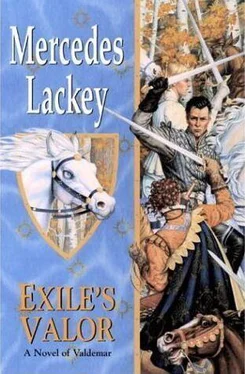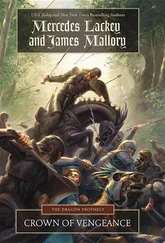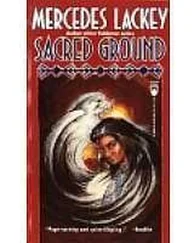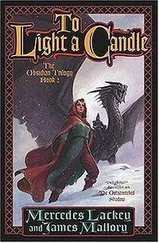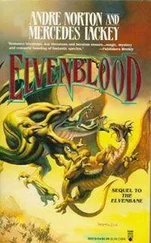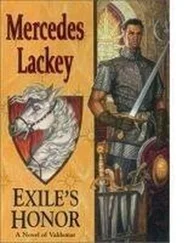“Oh—” Gartheser said weakly.
“Then there is my nephew, Kris—” said Orthallen quickly.
“Related to me within the third degree on both sides of his family, as his mother was a cousin-by-marriage of my father, and his father was a cousin-by-blood to my father,” she said briskly, already prepared for that one. “Besides being so young that there is no question of consummation for at least eight years.” She smiled dulcetly at Orthallen. “Which does rather negate the entire reason for marrying with such remarkable speed in the first place, before my year of mourning is over. Doesn’t it?”
To her great pleasure, Orthallen was left so stunned by her riposte that his handsome face wore an uncharacteristic blank look. Not that she wanted to humiliate him—she was really awfully fond of him, after all—but it gave her no end of satisfaction to make him understand, in no uncertain terms, that just because she was fond of him, she was not going to allow him to manipulate her into something she did not want to do.
And blessings upon Myste; she suspected that not even Orthallen knew about the nearness of her blood relation to his nephew. He proved it in the next moment by saying, cautiously, “I assume you have the particulars of these degrees?”
She went to the second page of Myste’s notes and gave him the genealogical details, chapter and verse, in a no-nonsense, matter-of-fact tone of voice.
“Ah,” he said. And wisely said nothing more.
So it went. Every single candidate that any of them brought up, she cut off at the metaphorical knees. Including the ones that she had not given Myste to research; that was why Myste was shut up in the library. She would leaf through her thick sheaf of papers to give Myste the chance to trace pedigrees, then pretend to read what Myste Sent to her.
At last they ran out of names—or at least, of names that they could all agree on. Now the daggers were out, and the looks being traded across the tabletop were wary. Any new candidates would be men and boys that had already been rejected, because one or another of the Councilors objected to them for reasons of his or her own. She could sit back and let them play against each other, which was the better position to be in.
At least, that was true among the highborn Councilors; the Guildmasters were a different story entirely. None of them—and no candidate outside of the nobility—would be related to her, which eliminated that argument.
However, she thought she could count on the highborn Councilors to fight tooth and nail against any common-born man being put up as a potential Prince Consort. There was an advantage to snobbery.
Mind, if she did happen to fall in love with a commoner, she wasn’t going to let snobbery stop her—
That would open up a whole new set of problems which she wasn’t going to think about right now. The current set was more than enough to deal with.
It’s too bad Alberich isn’t here now, she thought, letting her anger begin to die. This is the part he’d really enjoy—watching them cut the legs out from under each other.
Ah well. She hoped the installation of his window had gone well. She was looking forward to seeing it. It would be the only part of her day she was able to look forward to.
Why would anyone want to be a Queen?
***
“Oo wouldn’t want t’be a Queen?” demanded the rather drunken tart sitting at the table next to Alberich’s. “Larking about, doin’ whatever ye please, gettin’ waited on ’and an’ foot—”
Not from Haven, thought Alberich to himself. Though you have the accent, it isn’t quite good enough, my girl. And you aren’t nearly as drunk as you seem. What’s your game, and who put you up to it, I wonder.
Now perhaps, at any other time, perhaps in another year or so, she might have gotten away with such an ill-considered remark. But not now. Not when barely six months had passed, and Selenay had been making herself very popular with little gestures like the “Queen’s Bread.” People down here had a lot of trouble keeping their children fed, and one guaranteed free meal a day, at the trifling cost of lessons in rudimentary literacy and numeracy, was a small price to pay. A youngling down here couldn’t earn the price of that breakfast himself in the course of a morning. It was good economics to send your younglings to a temple until noon, then put ’em to work.
“’ere now!” a man just near enough to have overheard the speech stood up, glaring at her. “Our Selenay ain’t like that, ye owd drab, an’ if you was a man, I’d’a thrashed ye fer that!”
The woman shrank back, and well she should have. He was big and broad, and looked as if he knew very well how to handle that cudgel at his belt. “No offense meant, I’m very sure,” she said, hastily. “I didn’ mean Queen Selenay! I just meant, a Queen, in a gen’ral sort of way.”
The man glared at her. He was as drunk as the whore pretended to be, and he was at the very least going to say his peace. “ Our Selenay ain’t no layabout!” he insisted. “Why, I seen ’er, I even talked to ’er, couple’a nights afore the last battle. Come right to our fires, she did, ’avin’ a word with our officers, seein’ we ’ad good treatment!”
“Oh, yeah, an’ she talked t’ you, did she, ye old liar!” jeered someone else—
Ill-advisedly.
The drunk rounded on the skeptic with a roar, and grabbed the man’s shirt in one hamlike fist. Only the intervention of the “peacekeeper” that the proprietor of the Broken Arms had seen fit to hire prevented mayhem from breaking out. But there was the start of a fight, and under cover of it, the woman slipped out.
Alberich followed.
She wasn’t at all difficult to follow, the silly wench. She paid absolutely no attention to what was behind her. The man she accosted just outside the alleyway next to the tavern was a little more careful, but not enough to spot Alberich. He was a darker shadow in the alley—people always thought that wearing black would make them blend in with shadows, but it didn’t; it made them into man-shaped black blotches in an almost black place. Alberich was wearing several shades of very, very dark brown and gray. Each leg was a slightly different color. So was each arm. And his tunic was blotched. There was nothing about him that was man-shaped, when he stood in shadow.
“I’m not doin’ that no more!” the woman shrilled at her contact, just as Alberich eased within listening range. “You go do your own dirty work from now on!”
There was a murmur, too low for Alberich to make out the words.
“I didn’ get but a word out,” she said sullenly, “an’ up jumps this drunk bear and nearly thrashes me!”
More murmuring, and the clink of coins. The woman departed, muttering.
Alberich followed the man.
There had been a lot of money exchanged there for such simple services—a lot for this part of town, at any rate. Alberich hoped that his new quarry would try another quarter, one where such a payment would be the norm rather than the exception. And lo! As if his wish had flown straight to the ear of Vkandis, that was precisely what his quarry did.
It wasn’t a wealthy part of town; working class was more like it, but working class that got work regularly, of the sort that came with weekly pay packets and a little something extra on the holidays. A place, in short, where there were City Guards and constables on patrol regularly.
A place where Alberich could manage to do something to get them both arrested.
Which, as soon as a constable hove into view, Alberich did.
He nipped back around the corner so as to be able to intercept his quarry coming, apparently, from the opposite direction. It wasn’t hard; he knew this part of Haven better than the back of his hand. There were few yards with high fences and even fewer with dangerous dogs tied up in them. Once he came back around, he saw that the constable was strolling along at a leisurely pace that would take him past his quarry before Alberich reached the man. Good. He didn’t want the constable to actually see what was going on between him and the stranger, only hear it and make some inferences that, as it happened would be entirely unwarranted.
Читать дальше
